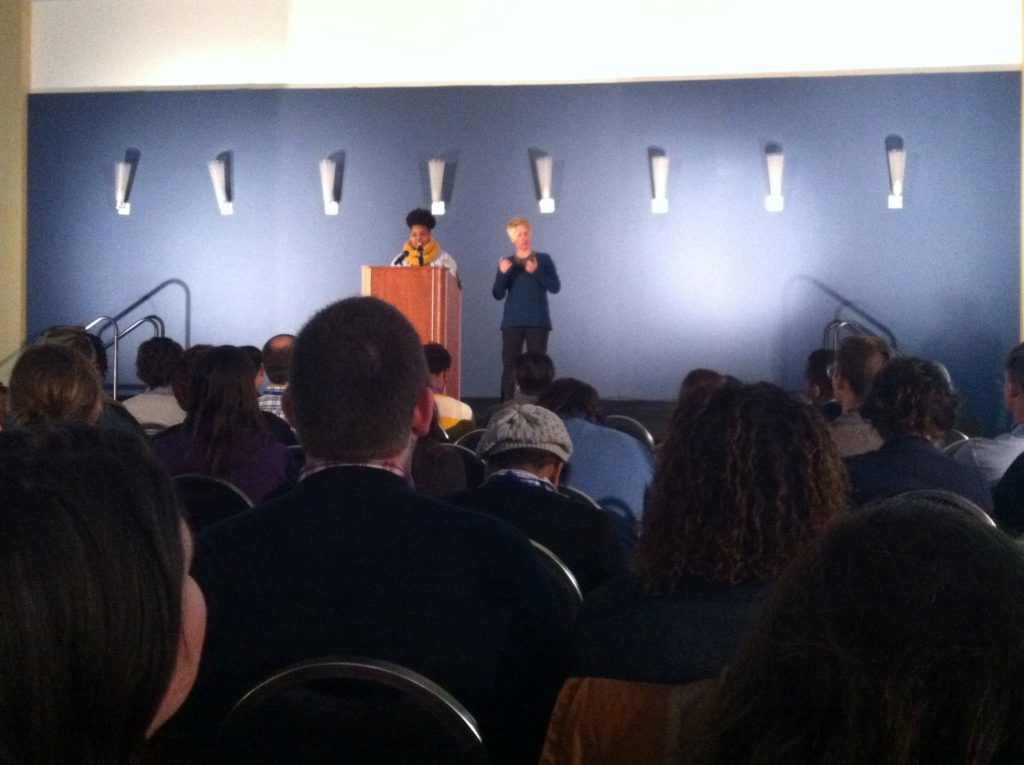
Jennifer Hollett is the Atkinson Associate on Civic Technology. An award winning broadcast journalist, Jenn uses social media to increase participation and mobilization in politics and social issues. Earlier this year, she gave a TEDxTalk on “How To Hate Politics” that outlined how technology is offering new ways to see and create social change. You can contact her at jenniferhollett.com.
RootsCamp is annual two day event for organizers, a project of the New Organizing Institute. It’s a self-proclaimed “unconference” because the agenda and sessions are created by those who attend. It’s a conference by organizers, for organizers, where organizers can … organize.
Here’s an overview of the key themes at this year’s RootsCamp:
1) The power of stories.
While storytelling is becoming a popular practice embraced in political and issues driven campaigns, it’s often overlooked day to day in our work. At RootsCamp, stories are woven throughout. From the volunteer in my first session telling the room she was raised by a single mom and to the stories of Walmart workers fighting for more hours and respect in the documentary ‘Can’t Take it No More!’, stories draw us closer and stick with us. And we never get tired of hearing them. It’s a good reminder to use stories any time you can in your work.
2) Building relationships.
RootsCamp creates numerous opportunities for participants to build relationships. This includes spaces for caucuses (groups that get together around interests, e.g. international, LGBTQ, tech), as well as an ice-breaker exercise in the opening session where thousands of audience members turn to each other with introductions, and the answer to the question “who are my people.” RootsCamp by design reminds us how important relationships are to organizing.
Many digital sessions also stressed the point. As highlighted in a session on online targeting, “behind the internet are people.” Just like traditional movements, online movements start with organic relationships. Digital tools allow us new ways to build relationships, but the time must still be spent getting to know someone and creating a relationship to work together.
3) Many voices.
Political and issue driven campaigns remain very white spaces, missing perspectives and ideas only offered from a diversity of voices. Instead of an opening keynote speaker, RootsCamp opted for a series of Ignite speakers, rapid fire style that spoke to a wide range of issues, from public education to prison reform. It was powerful, engaging, and inclusive. The call for diverse groups came from numerous sessions. Be it the climate change organizing or comedy writing rooms, diversity is needed in these spaces to help progressive movements grow and succeed, and to serve constituents.
4) Digital integration.
With endless discussions on the future of digital on political campaigns during the weekend, many were sharing ideas on what’s next for civic tech. There was one point raised in every session: integration. From connecting offline and online organizing, to creating a culture of collaboration between digital and communications, to “digital folks should start running campaigns.” Campaigns need to start thinking how digital can be integrated into campaigns at large.
5) You can feel movements.
The two most tangible movements at RootsCamp this year were #BlackLivesMatter and the “Ready for (Elizabeth) Warren” campaign. Both groups were organizing all weekend, engaging with participants. There were Black Lives Matter signs distributed and photos taken in solidarity, plus many at RootsCamp attended the Saturday march for justice in D.C.. The Warren team was handing out tattoos, getting signatures for “Run Liz Run” postcards, plus toting around an Elizabeth Warren Hunger Games cutout. All of these tactics created an energy, and sense of momentum at RootsCamp, highlighting the pull and excitement of people coming together to change the world.
